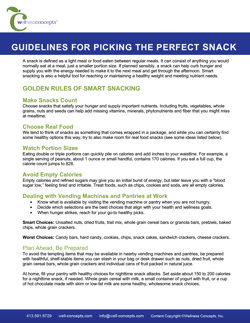A snack is defined as a light meal or food eaten between regular meals. It can consist of anything you would normally eat at a meal, just a smaller portion size. If planned sensibly, a snack can help curb hunger and supply you with the energy needed to make it to the next meal and get through the afternoon. Smart snacking is also a helpful tool for reaching or maintaining a healthy weight and meeting nutrient needs.
GOLDEN RULES OF SMART SNACKING
Make Snacks Count
Choose snacks that satisfy your hunger and supply important nutrients. Including fruits, vegetables, whole grains, nuts and seeds can help add missing vitamins, minerals, phytonutrients and fiber that you might miss at mealtime.
Choose Real Food
We tend to think of snacks as something that comes wrapped in a package, and while you can certainly find some healthy options this way, try to also make room for real food snacks (see some ideas listed below).
Watch Portion Sizes
Eating double or triple portions can quickly pile on calories and add inches to your waistline. For example, a single serving of peanuts, about 1 ounce or small handful, contains 170 calories. If you eat a full cup, the calorie count jumps to 828.
Avoid Empty Calories
Empty calories and refined sugars may give you an initial burst of energy, but later leave you with a “blood sugar low,” feeling tired and irritable. Treat foods, such as chips, cookies and soda, are all empty calories.
Dealing with Vending Machines and Pantries at Work
- Know what is available by visiting the vending machine or pantry when you are not hungry.
- Decide which selections are the best choices that align with your health and wellness goals.
- When hunger strikes, reach for your go-to healthy picks.
Smart Choices: Unsalted nuts, dried fruits, trail mix, whole grain cereal bars or granola bars, pretzels, baked chips, whole grain crackers.
Worst Choices: Candy bars, hard candy, cookies, chips, snack cakes, sandwich crackers, cheese crackers.
Plan Ahead, Be Prepared
To avoid the tempting items that may be available in nearby vending machines and pantries, be prepared with healthful, shelf-stable items you can stash in your bag or desk drawer such as nuts, dried fruit, whole grain cereal bars, whole grain crackers and individual cans of fruit packed in natural juice.
At home, fill your pantry with healthy choices for nighttime snack attacks. Set aside about 150 to 200 calories for a nighttime snack, if needed. Whole grain cereal with milk, a small container of yogurt with fruit, or a cup of hot chocolate made with skim or low-fat milk are some healthy, wholesome snack choices.
Fitting Snacks into Your Meal Plan
Snacks can be eaten whenever you find them most useful, but most of us require about 1-2 snacks per day. Typically, the largest gap in our day occurs between lunch and dinner, but you may find you also need a snack before lunch. Below you will find a suggested breakdown of snack calories based on the total number of calories you take in for the day.
Category 1: Individuals who need 1,200 to 1,600 calories a day
Snack Smart Guideline: Choose one or two snacks totaling 200 calories per day as part of your daily calorie allowance
Category 2: Individuals who need 1,600 to 2,000 calories a day
Snack Smart Guideline: Choose one to two snacks totaling 300 calories per day as part of your daily calorie allowance
Category 3: Individuals who need 2,000 to 2,400 calories a day
Snack Smart Guideline: Choose two snacks totaling 400 calories per day as part of your daily calorie allowance
Note: Individuals who are trying to gain weight: Choose one to two daily snacks totaling 300 to 400 calories per day in addition to your daily calorie allowance.
Mix ‘N Match from these Healthful Snacks to Fit Your Snack Smart Guideline
Note: Be sure to read food labels to ensure the products you pick meet your caloric needs.
75 – 100 calorie snacks
- 1 Hardboiled egg
- 1 cup grapes
- Fresh apple or pear
- 1 mozzarella stick, part skim
- 1 tablespoon hummus + 4 whole grain crackers
- 3 cups air-popped popcorn
- 1/3 cup edamame
- 8 baby carrots + 2 tablespoons hummus
- Half a baked potato with salsa
- 14 almonds
100 – 150 calorie snacks
- 40 pistachios
- 1/2 cup plain nonfat Greek yogurt with 1 tsp honey
- 8 ounces nonfat latte
- 1 small sweet potato
- 1/4 avocado on whole grain crackers
- 1/2 cup reduced fat (2%) cottage cheese + fruit
- 1 ounce canned tuna or salmon + crackers
- 5 ounces low-fat Greek fruit yogurt
150-200 calorie snacks
- 1 ounce unsalted nuts
- Mini whole grain pita bread + 1 tablespoon almond butter
- 1/2 peanut butter & jelly sandwich on whole grain bread
- 1/2 whole grain English muffin with cottage cheese
- 10 baked tortilla chips with 1/2 cup salsa
- Turkey and cheese roll-up (1 ounce each)
- 1 cup nonfat milk + 1 cup whole grain cereal
- 8 ounces low-fat kefir + 1 cup fresh berries
Want to learn more? Download the Guidelines for Picking the Perfect Snack handout and share with your friends, family, and colleagues.


